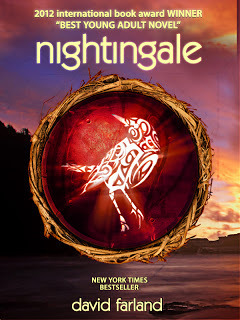Surprising Emotions: How Will Your Character React?

I'm honored to have David Farland with us today to give us his take on the importance of character emotions and how reactions can often surprise and enthrall readers.
David has written and edited fifty
published books and has trained
several international bestselling
authors like Brandon Sanderson in fantasy, Brandon Mull in middle-grade
fiction, and Stephenie Meyer in young adult fiction.
David also teaches workshops, is the creator of David Farland’s Daily Kick in the Pants, an email
bulletin for writers, and, well, has the most amazing eyes (seriously, take a look!) His award-winning YA Fantasy novel, Nightingale sounds incredibly fantastic. I've included the blurb below, so make sure to take a peek!
Surprising
Emotions by David Farland
When I was thirteen, I met my grandfather
for the first time, and he told me about his life in the Mafia. “I ran whorehouses and gambling joints in the
Midwest, for more than thirty years,” he said, “mainly from Detroit down into
Chicago.” It’s the kind of admission
that I would expect a person to shrink from making, rather vile and
repugnant. But you should have seen
him. His back straightened, his chin
rose, and his gaze drifted wistfully to the horizon. He was so proud to have been a mob boss.
I learned a lot about my grandfather that
day, but he spoke little, so the most important things that I learned came from
visual cues.
For writers, learning how to describe the
physical manifestations of emotions is vital.
But just as important is knowing when
to focus on showing an emotion and what emotion to focus on.
As a judge for a large writing contest, I frequently
read manuscripts where new authors spend a great deal of time giving me the physical
cues of emotions that we rather all expect.
Thus, the descriptions can feel boring and over-wrought, even if they’re
honest.
You have to decide when to focus.
You see, if your character is facing a
charging rhino, your reader will expect that he’s scared. In fact, if you depict the charge well, the
reader will actually feel some fear. His
adrenaline will surge, his heart will beat faster, his muscles will tighten, blood
will rush to his brain, his mouth will dry.
The physical manifestations won’t be as strong as when you actually live
through the incident, but the echoes will be there.
So I may not need to focus on my
protagonists emotions too much in that circumstance.
But when a character has a surprising reaction to an incident, then
it becomes imperative to document what’s happening. Surprising reactions can be one of three
kinds.
Under-reaction. Let’s go back to
our charging rhino. What if, instead of
having my character turn tail and run, as all of his companions do, he only
becomes slightly discomposed? It may be
a signal he has faced death before and knows exactly what to do, or that he’s
just the kind of person who loves to face a challenge. So as an author, I might want to spend a bit
of extra time and effort showing his reaction.
Over-reaction
can also be fun.
Let’s imagine that our character is a seasoned big-game hunter at the
turn of the twentieth century. He’s
Teddy Roosevelt, a war hero, with an elephant gun. A rhino charges. The other hunters in the party expect him to
stand boldly in the rhino’s path, take careful aim, and bring the behemoth
down. Instead, Teddy takes one look, his
eyes roll back in his head, and he faints.
That kind of over-reaction—the fluttering eyes, the stricken expression,
even his slow fall to the ground—might be worth a good page or two.
Wrong
Reactions. Let’s
face it, sometimes characters don’t react to a situation the way that we think
that they should. For example, evidence
indicates that one tribe of ancient Neanderthals both ate woolly rhinos—and worshipped
them. To kill one, the hunter had to
face it as it charged, then hurl a spear at point-blank range as he dodged
aside.
So how would such a Neanderthal react to
such a charge? Imagine that his children
are hiding in a cave. His pregnant wife is
hungry, and god has come to give himself.
An eager hunter might react to the charge with tears of joy. He might race toward his prey singing songs
of thankfulness. And once again, I want
that account to be drawn to graceful perfection.
In short, when
you’re writing character emotions, don’t report every sundry emotion—surprise
us, both with the type of emotion you’re portraying and with your
loquaciousness at portraying it!
Nightingale

Some
people sing at night to drive back the darkness. Others sing to summon
it. . . .
Bron Jones was abandoned at birth. Thrown into foster care, he was rejected by
one family after another, until he met Olivia, a gifted and devoted high-school
teacher who recognized him for what he really was--what her people call a
"nightingale."
But Bron isn't ready to learn the truth. There are secrets that have been
hidden from mankind for hundreds of thousands of years, secrets that should
remain hidden. Some things are too dangerous to know. Bron's secret may
be the most dangerous of all.
This book has some pretty amazing reviews, and I'm adding it to my Goodreads! If you'd like to as well, you can find it HERE. A big thanks to David for hanging out with us today--I am now trying to think of ways to create a surprise reaction on my NANO novel!
David has a lot of great things going on at his website (including a boatload of writing tips!) and you can find him on both FaceBook and Twitter.
Happy writing and enjoy the weekend, everyone!

Published on October 19, 2012 03:30
No comments have been added yet.
Writers Helping Writers
A place for writers to find support, helpful articles on writing craft, and an array of unique (and free!) writing tools you can't find elsewhere. We are known far and wide for our "Descriptive Thesau
A place for writers to find support, helpful articles on writing craft, and an array of unique (and free!) writing tools you can't find elsewhere. We are known far and wide for our "Descriptive Thesaurus Collections" which help authors create vivid imagery and sensory detail for their Settings, Characters (physical descriptions, emotions, skills & talents, etc.), Symbolism, Weather, and a whole bunch more. Stop in and say hello! :) http://writershelpingwriters.net/
...more
- Angela Ackerman's profile
- 1023 followers



